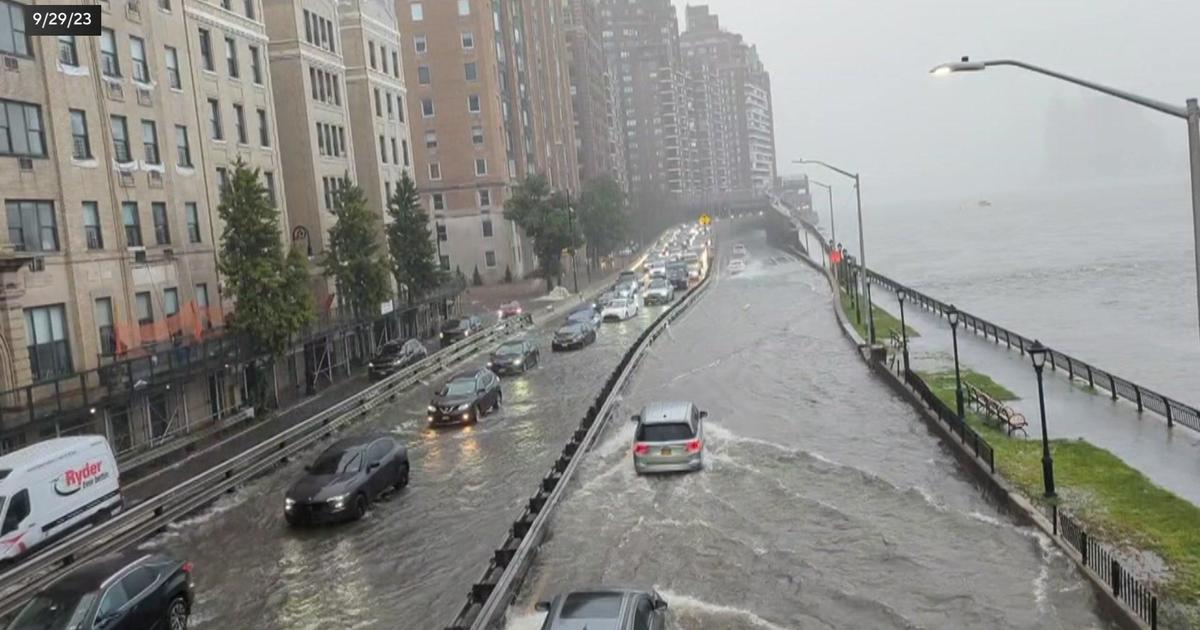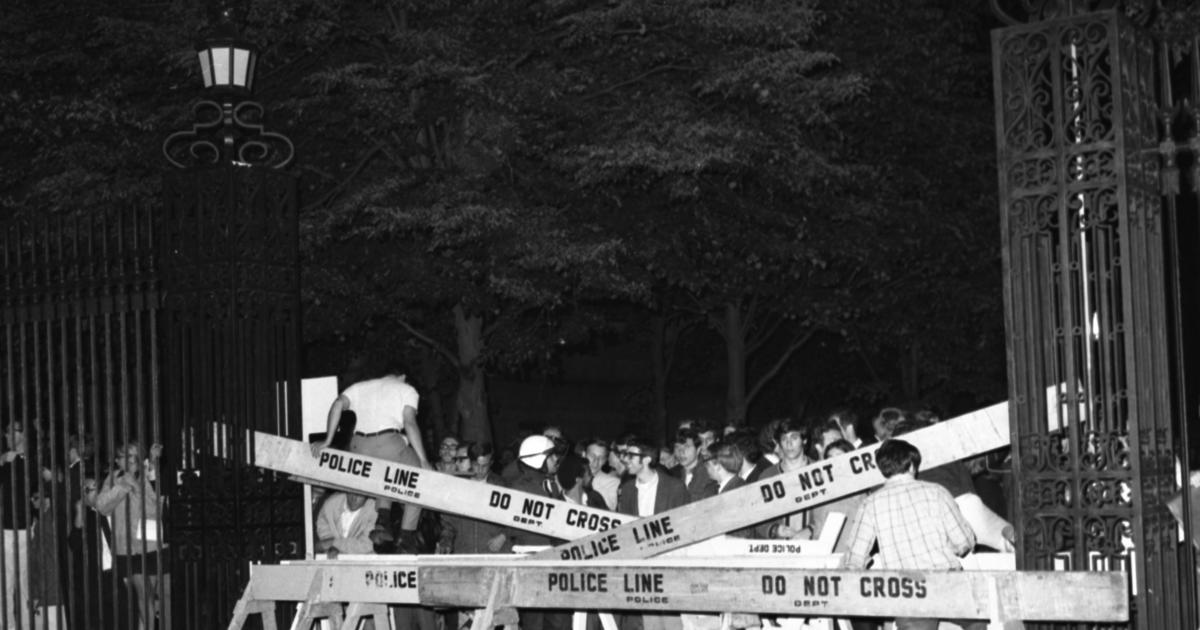Debate Surrounding Indian Point Nuclear Plant Continues To Rage In New York
BUCHANAN, N.Y. (CBSNewYork/AP) -- Imagining New York's energy supply without the Indian Point nuclear power plant, some see dirtier air, higher utility bills and an increased risk of blackouts.
Others see a lower risk of catastrophe from a terror attack or natural disaster.
And some see a long-term opportunity for alternative sources like solar panels on Manhattan rooftops and wind farms in the waters off New York Harbor.
The two reactors in Buchanan, 35 miles up the Hudson River from midtown Manhattan, provide about a quarter of the power used in New York City and Westchester County. The plant began operating in the 1970s and licenses for the plant's two reactors are set to expire in 2013 and 2015.
Gov. Andrew Cuomo has declared his resolve to block relicensing; his aides recently met with the plant's owner, Entergy Nuclear. "We know he wants to shut it down," said company spokesman Jim Steets.
Critics have focused for years on preventing any relicensing for Indian Point 2 and Indian Point 3. (Indian Point 1, from the 1960s, was mothballed in 1973.) Opposition spiked after the 2001 terror attacks, when one of the hijacked airliners flew right over the plant. Leaks of radioactive water, problems with emergency sirens, and the earthquake and tsunami crises at Japan's Fukushima Daiichi nuclear plant have intensified the battle.
Of particular concern are evacuation plans in an emergency. An evacuation of 50 miles around Indian Point -- the recent U.S. recommendation for American citizens around the Japanese plant -- would mean moving out more than 17 million people, including almost all of New York City.
The governor, who lives 12 miles from Indian Point, has said he considers the plant "an unnecessary risk."
"I'm not against nuclear power but I am against nuclear power in this plant in this location with this density in Westchester County, with its proximity to New York City," he said.
Nuclear plants are regulated by the federal government, not the states. But Cuomo does have a weapon -- a state water permit, so far withheld, that's required for the new licenses.
Vermont is also battling to close a nuclear power plant, one also owned by Entergy. The governor and Legislature there are pushing to shut the Vermont Yankee plant when its license expires in March. Sarah Hofmann, deputy commissioner of the Vermont Department of Public Service, said replacement power is not an issue there, although Entergy predicts higher consumer costs if it's shut down.
Much of the concern about the effects of a sudden Indian Point shutdown comes from New York City.
A new study commissioned by the city's Department of Environmental Conservation concluded in a preliminary draft that New Yorkers would pay more, the grid would become less reliable and air pollution would increase because most replacement power would come from fossil fuels.
That draft, leaked last week, estimated energy costs would rise up to 10 percent, not including any subsidies to new energy providers, upgrades to the grid or the costs of 1,100 jobs lost at Indian Point.
Leaders from several state agencies responded with a statement saying the figures in the study could also support the conclusion that closing Indian Point "is commercially feasible, does not compromise reliability, and has little impact on cost." They said consumers would pay 5 percent more at most.
The officials also said Indian Point's reliability was assured until 2020. The city study and a forecast from Con Edison, the city's primary distributor, both predicted that without Indian Point, reliability problems would start in summer 2016 -- after the second reactor's license expires.
The dates are important because of the time needed to build new power plants. Experts estimate it would take three to five years for construction of a natural gas-fired power plant, even with new regulations pushed through by Cuomo that have streamlined the approval process.
It's still difficult to find a place to put a plant, especially in a densely populated area.
"The city administration has not encouraged any new plants to be built because of the political headaches that it causes," said Jerry Kremer, chairman of the New York Affordable Reliable Electricity Alliance, an industry group. "There is nothing of any substance in the pipeline which is going to provide additional power for the downstate region."
Philip Musegaas, a program director at the environmental group Riverkeeper, a longtime Indian Point critic, strongly disagreed, saying the region is well prepared to do without the nuclear plant.
He said that new transmission cables will bring in power from New Jersey and Quebec, and that energy efficiency projects are already dampening demand. The new regulations pushed by Cuomo will encourage smaller plants and boost wind and solar energy development, he said.
"This idea of an immediate energy shortage is just not reflected in the facts," Musegaas said. "If these measures that I've mentioned continue to progress over the next four years, we will have a stable energy supply and we can transition out of Indian Point."
Eventually, he said, wind and solar projects close to the city can be major contributors. He cited an ongoing City University project that found solar energy from the city's rooftops could meet half its demand. He said there was "tremendous potential" for wind-powered generation offshore.
Musegaas noted that whenever Indian Point closes, it's likely to leave behind another problem -- its radioactive waste, currently stored on site in pools and casks. President Obama has refused to approve Yucca Mountain near Las Vegas as a disposal site and there is no other long-term plan for the nation's nuclear plants.
Cricket Valley Energy, an affiliate of Advanced Power Services, plans a 1,000-megawatt gas-fired plant in Wingdale, N.Y., about 65 miles north of the city, projected to open in 2015. Company officials said Indian Point's future was not a factor in the investment.
Another gas-powered plant with a 650 megawatt output is planned by Competitive Power Ventures Inc. in Wawayanda, about 50 miles from Manhattan. Spokesman Steve Sullivan said it could be open by 2014.
There is a good chance that Indian Point will be running beyond its expiration dates even if it doesn't have a new license. The Nuclear Regulatory Commission says that if its hearings -- likely to start next year -- go beyond the deadline, the plant would be allowed to stay online. The same would apply if the state denies the water permit and Entergy challenges that ruling in court.
In the hearings, New York and environmental groups are alleging, among other things, that Entergy has not detailed how 20 more years of operation would affect buried pipes and cables and the domed "containment" buildings that house the reactors.
The water permit relates to Indian Point's use of Hudson River water -- it takes in as much as 2.5 billion gallons a day -- to make steam and cool the reactors. The permit has been withheld because the current cooling system kills nearly a billion organisms a year, including the endangered shortnose sturgeon.
The agency said Indian Point can operate legally if it converts to a water-recycling system known as closed-cycle. But Entergy said that would cost more than $1 billion. It claims its proposal -- a new screening system that would keep most fish out -- makes more sense.
No compromise seems close. Steets, the Entergy spokesman, said his company is not interested in a deal like that at the Oyster Creek plant in New Jersey, where the state backed off a demand for cooling towers when the owner, Exelon, agreed to close the plant 10 years before its 2029 license expiration.
Where Do You Stand On The Indian Plant Nuclear Debate? Share Your Thoughts In The Comments Section...
(TM and Copyright 2011 CBS Radio Inc. and its relevant subsidiaries. CBS RADIO and EYE Logo TM and Copyright 2011 CBS Broadcasting Inc. Used under license. All Rights Reserved. This material may not be published, broadcast, rewritten, or redistributed. The Associated Press contributed to this report.)



